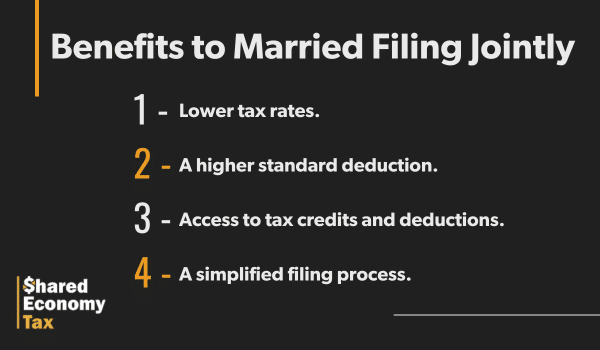
It’s hard enough to navigate taxes when you’re on your own, but once you get married, everything becomes more complicated. Married couples face a unique set of challenges and opportunities. As a married couple, you have some flexibility to maximize your financial benefits and minimize your tax liabilities. From optimizing filing status to leveraging deductions and credits, you have numerous options at your disposal. Take into account these married couples tax tips.
An Overview of Taxes for Married Couples
When considering filing jointly, it’s important to consider the tax implications. Filing jointly provides access to various tax benefits. This includes benefits such as a higher standard deduction, potential eligibility for valuable tax credits and deductions, and the ability to share and offset certain losses.
You should carefully analyze your specific financial situation and consult with a tax professional to fully understand the implications and make informed decisions that optimize your tax outcome.
Filing taxes jointly with your spouse offers several significant benefits. It often allows for a higher standard deduction, which can lower your taxable income. Your income is also taxed using the married filing jointly tax tables, which can be very beneficial if you and your spouse have significantly different incomes. Additionally, certain tax credits and deductions, such as the Earned Income Tax Credit and certain education credits, are only available when filing jointly.
With proper planning, you can overcome most challenges and optimize your tax situation, minimizing your tax burden.
What Filing Options Do Married Couples Have?
There are options for married couples when it comes to their filing status.

Married Filing Jointly
This is a tax filing status where married couples combine their incomes and file a single tax return. The advantages of filing jointly include:
- Lower tax rates.
- A higher standard deduction.
- Access to tax credits and deductions.
- A simplified filing process.
However, there are some disadvantages, such as joint and several liability for tax debts, potential limitations on deductions or credits, and the possible impact on eligibility for certain benefits.
Married Filing Separately
Married filing separately is a tax filing status where married couples choose to file their tax returns individually. The rules for splitting your income will depend on whether you are in a community property state or not.
The advantages of filing separately include separate tax liability, protection of personal finances, and potential access to certain deductions.
However, there are disadvantages, such as higher tax rates, potential loss of tax benefits, limitations on deductions, and complex tax calculations. Therefore, it’s crucial to carefully consider your specific circumstances and consult with a tax professional to determine the best filing approach for you and your spouse.
How Can Married Couples Maximize Deductions and Credits?
Married couples can take advantage of several common deductions and credits to reduce their tax liability.
Strategies for Optimizing Deductions and Credits
Itemizing vs. Standard Deduction: Compare the total amount of your itemized deductions, such as mortgage interest, state and local taxes, and charitable contributions, with the standard deduction. Choose the higher option to minimize your taxable income. Tracking and documenting your expenses throughout the year may be beneficial to determine if itemizing exceeds the standard deduction.
Evaluating Tax Credit Eligibility: Review eligibility criteria for tax credits like the Child Tax Credit, Earned Income Tax Credit, or education-related credits. These credits can provide significant tax savings. Ensure you meet the requirements and gather the necessary documentation to claim them accurately.
Education-Related Deductions or Credits: If you, your spouse, or your dependent(s) pursue higher education, explore education-related deductions or credits. Deductions such as the American Opportunity Credit or Lifetime Learning Credit could help. These can help offset the costs of tuition, fees, and educational expenses. Understand the eligibility criteria, income limits, and allowable expenses to maximize these benefits.
Married Couples Tax Tips for Dual-Income Couples
Dual-income married couples may need to coordinate their withholdings to ensure they are not over- or underpaid when they file their returns.
Tax Management Tips
The tax strategies for married couples are similar to single filers, except that there are additional calculations and coordination required to optimize your tax situation.
It would be best to optimize your tax withholdings by reviewing your Form W-4 with your employer. Ensuring the proper withholding allowances can help you avoid underpayment penalties or giving the government an interest-free loan through overpayment.
Regularly review your tax strategy to accommodate any personal or financial changes that may impact your tax situation. This could include purchasing a new home, a dependent going to college, or a spouse taking a break from working (or experiencing a significant income reduction).
Another important aspect is to maximize your retirement contributions. They offer immediate tax benefits by reducing your taxable income while helping you save for the future. Finally, consider tax-efficient investments and strategies like tax-loss harvesting to minimize tax liability.
Suppose you need help determining the appropriate withholdings or what deductions are available to you. In that case, you should seek professional guidance from a tax professional who can provide expert advice, ensure compliance with tax regulations, identify overlooked opportunities, and optimize your tax strategy based on your specific circumstances.
What Tax Benefits Are Available to Married Couples with Children?
Married couples with children can take advantage of various tax benefits to reduce their tax liability. These include the Child Tax Credit, which provides a credit for each qualifying child, and the Child and Dependent Care Credit, which allows you to claim a percentage of child care expenses—the Earned Income Tax Credit benefits low- to moderate-income working couples with children.
To benefit from these credits, couples must meet eligibility requirements. They must also accurately document child-related expenses. Finally, they must consult with a tax professional or use tax preparation software for guidance.
The Best Tax Tips for Newlyweds
Though it may not be the most romantic topic, newlyweds should consider how marriage will impact their tax situation. They should take married couples tax tips seriously.
Most importantly, you should update your personal information, such as name changes, with the necessary agencies and employers to ensure consistency in tax-related documents. Then you should evaluate whether filing jointly or separately is more advantageous for your situation, considering potential tax rates and benefits differences.
Adjusting your tax withholdings on the W-4 form can help align them with your new tax circumstances. It can also prevent underpayment or overpayment. Maximizing retirement contributions to reduce taxable income and secure future savings is also important.
You and your spouse should explore potential tax benefits related to homeownership. Deductions for mortgage interest and property taxes, may further optimize your tax situation. In addition, assess health insurance options to determine if joining a spouse’s plan or obtaining a joint plan offers better coverage and potential tax advantages.
As a newlywed, you should familiarize yourself with the concept of the marriage penalty or bonus to understand how your combined income may impact your tax liability. Consider seeking guidance from a tax professional. A tax professional can provide personalized advice tailored to your specific needs and help navigate complex tax laws.
Key Takeaways for Married Couples Tax Tips
Tax planning and awareness are vital for the married couples tax tips mentioned in this article to optimize their tax situation. It is important to understand the different filing options available. Whether filing jointly or separately, carefully evaluate which approach is most advantageous for your specific circumstances.
Married couples should explore and take advantage of deductions and credits designed explicitly for them. Deductions and credits to consider are the standard deduction, itemized deductions, and various tax credits related to children, education, and dependent care.
Regularly reviewing and adjusting your tax strategy is crucial as your circumstances change. This ensures you maximize your tax benefits. Seeking advice from a tax professional can provide personalized guidance and help you develop a customized tax plan and strategy tailored to your unique needs and goals.